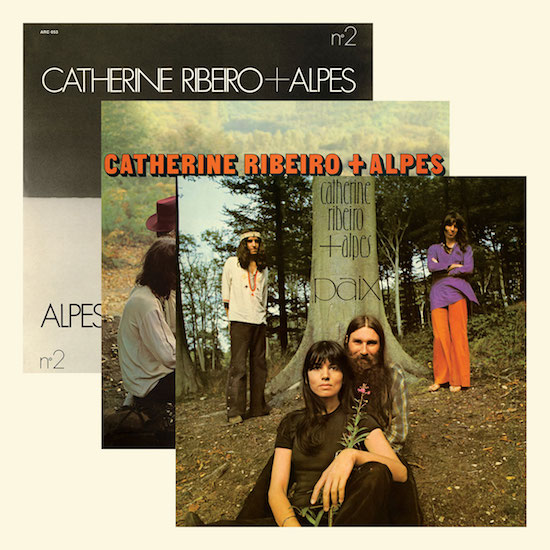Born in Lyon in 1941, the daughter of working class Portuguese parents, Catherine Ribeiro holds unique dominion in both the European avant-garde and in Gallic-leaning psychedelia of the 1970s.
Though she has continued to release music, together with Alpes – a band led by her songwriting partner Patrice Moullet – Ribeiro guided trance and tension to the fringes of darkly netherworlds on three successive albums: No2, Ame Debout and Paix. This long out-of-print trilogy, championed by Kim Gordon among others in recent years, has been reissued by Anthology Recording and reveals a dense nexus linking prog and cosmic ritualism with free jazz and European medieval traditions.
Titled as such to reference their previous guise as the short-lived Catherine Ribeiro + 2 Bis, 1970’s No2 is a fervent, at times remarkable first point of entry. After opening incantation ‘15 Août 1970’ and shivering prog-folk chanson ‘Silen Voy Kathy’ strike an anguished tone, 18-minute centrepiece ‘Poeme Non Equipe’ sees Ribeiro’s sprees double up as a protracted primal scream. Banshee shrieks one moment, sobbing glossolalia the next – it’s a siren call that, dreamt up in the feverish residuum of May 1968, is as much a political decree as it is an unknowable spiritual expulsion.
No2 caught the attention of Philips Records, who signed the group in 1971; their follow-up Ame Debout proved yet more impressive. Peaking on the raga guitar and fast tabla attack of its title track, as well as the minimalist kosmische of the two-part ‘Alpes’, Ribeiro and Alpes run rings around second-guessers listening in. Bleak and beatific, chaotic yet sensual, Ribeiro’s implosions – cast out above Moullet’s shapeshifting avant-folk – make short work of lazy comparisons to Nico in the process (they both started off as underground actresses that would later front bands).
But it’s on 1972’s Paix – the gateway to Ribeiro + Alpes for many – that this long-overdue reissue comes into its own. Alongside Jean-Sebastien Lemoine on bass, Patrice Lemoine on organ and drummer Michel Santangelli, Moullet’s homemade instruments (the cosmophone and percuphone) weave droning, unearthly prog textures around Ribeiro’s range-leaping death throes. As its 25-minute closer ‘Un Jour… La Mort’ simmers out into oblivion, the silence is simply an open invitation to delve deeper.


